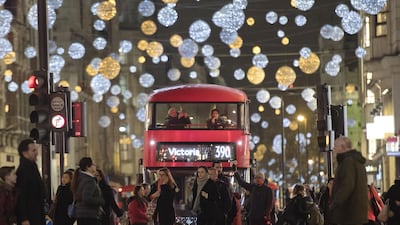When the UK’s second-biggest cell-phone network went down on Thursday, it struck transit riders, workers in the gig economy, small businesses and the self-employed.
Among the victims of Telefonica-owned O2’s widespread data outage were commuters hoping to use their smartphones to find when the next bus was due. The systems on board all 8,500 London buses, which send live location data back to the city’s transit authority and third-party mapping services, were knocked offline.
Information screens in the bus stations were unable to display real-time updates because the system relies on connectivity to O2’s data network. On Thursday, the screens simply told passengers that “bus information is not available.”
A spokesman for Transport for London said buses have backup radio communication, but this only assists operational purposes rather than providing live customer information.
Frustrated commuters couldn’t turn to any of the 11,500 bikes that form London’s public-bicycle service either: the terminals used to pay for the rental bikes rely on a connection to O2. Only holders of an annual pass were able to take out a bike, as this doesn’t need an internet connection to function.
It was a software failure that brought down O2’s services, as well as those of Tesco Mobile, Sky, GiffGaff and TalkTalk, which piggyback on the network. Downdetector UK, a site that monitors network complaints, said customers began having issues around 4:45am on Thursday. Millions were unable to use their phones for most of the rest of the day.
_______________
Read more:
Karl Sharro on flying cars, underground networks and the future of cities in the Gulf
So, just how should internet users store their data?
_______________
Shane Bunnage, a personal fitness trainer in Hertfordshire, said the outage had a “massive impact” on his ability to run his company. “All the work I do is mobile and outdoors,” he said. “I couldn’t book clients in for classes, check memberships, take payments for personal training sessions or use Google Maps.”
According to the Office for National Statistics, about 15 per cent of the UK’s labour force is self-employed, and the rise of the gig economy has only increased the number of individuals going it alone in business.
Food-delivery service Deliveroo, which relies on a fleet of cyclists and drivers to take food from restaurants to hungry customers, posted a warning to people using its app that “network providers were experiencing problems” and that deliveries might be slower than usual. Representatives for the company didn’t respond to a request for comment.
Some of those impacted posted on social media that they had actually enjoyed the chance to connect live with other human beings.
However, by Friday, O2's network had been restored. The company is preparing to bill its technology supplier Ericsson tens of millions of pounds, The Sunday Telegraph reported, as well as credit free air time and discounts to affected consumers.

